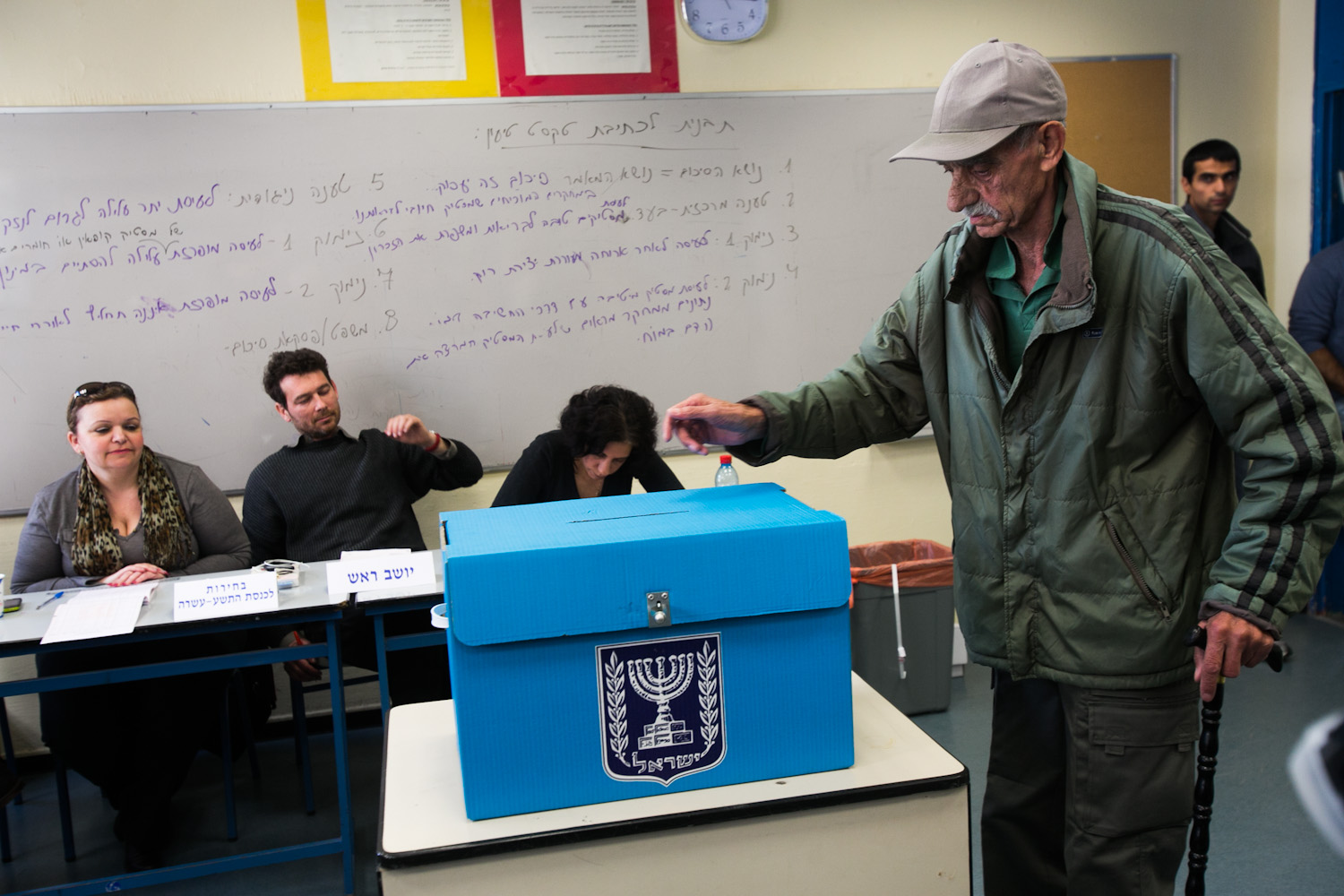With almost all the votes counted, it is clear that support for the prime minister’s party has collapsed, journalist Yair Lapid has led his new centrist party to second place and Meretz has doubled its strength.
With roughly 98 percent of the votes cast in the Israel’s elections counted, Netanyahu’s Right-Orthodox bloc appears to have captured 61 seats out of the Knesset’s 120 (as opposed to 65 in the current Knesset). The prime minister’s joint ticket with Avigdor Lieberman’s faction – called Likud-Beitenu – has 31 seats, as opposed to the 42 the two parties together hold in the current Knesset. The surprise winner of the day is former Channel 2 anchorman Yair Lapid, whose new centrist party won 19 seats, making it the second-largest party in the Knesset.
Some more changes are expected after all the IDF soldiers’ votes are counted, which could take until Thursday.
Meretz has doubled its representation to six seats, while Labor finished with a disappointing 15. Naftali Bennett’s Jewish Home party, which is associated with the settler movement, won 11 seats – a few less than most polls had predicted (though he could win another seat from the soldiers’ votes). As for the other parties, Shas came away with 12 seats, United Torah Judaism 6, Hatnuah (Tzipi Livni’s party) 6, United Arab List 4, Hadash 4, Balad 3, and Kadima 2.
Below are the updates and analysis we posted throughout election night in our live blog.
Analysis: Netanyahu’s disastrous victory

Benjamin Netanyahu is pretty certain to be Israel’s next prime minister, but these elections have been a disaster for him and it’s still incredible how close he came to losing – despite the demographic trends in his favor, the lack of outside pressure and the relative security and economical stability Israelis enjoyed under his term. Netanyahu called early elections in order to renew his mandate before introducing budget cuts and dealing again with Iran, and he ended up barely getting reelected.
The terrible campaign led by Netanyahu – with endorsements from Donald Trump and Chuck Norris, and photos near the Western Wall in Jerusalem – seemed designed to win a seat in Florida, not in the Knesset. His struggle with the settlers – a war over power, not a dispute over ideology – has cost both sides some support, driving undecided last-minute voters to Yair Lapid, whose all-Israeli image turned out to be what many voters wanted. Luckily for Netanyahu, Lapid is probably the most comfortable adversary he could hope for, and he is not likely to cause any problems on the Palestinian issue. (Dimi Reider and Roi Maor explain why.)
There seem to have been issues at play that go beyond Netanyahu’s bad campaign. The prime minister is paying a price for doing nothing despite leading a very stable government. He didn’t pursue internal reform on crucial issues like the military draft or the burden on the middle class (which is what launched the 2011 social protest), and he refused to make any move on the Palestinian issue. Bibi’s responses to the crises he faced always took the form of political manoeuvring: the short-lived government with Kadima, or the unification with Avigdor Lieberman’s Yisrael Beitenu – a move that saw the joint ticket lose at least 10 seats.
To all that, add Netanyahu’s confrontational style (both towards the world and towards the opposition and minorities at home), which helped rally the fragmented opposition, not so much around a cause or a candidate, but against the prime minister.
So Netanyahu won these elections, but he will lead a weaker government than the one he led for the last four years, and he will have a harder time escaping challenges. As I wrote earlier, this is not likely to result in any new initiative on the Palestinian issue, especially given the large bloc of hawks and settlers he is still dependent on. There is something elusive about these elections – they seem to reflect some deep shifts within the Jewish public. But they won’t result in much movement on the issue most outside observers care the most about – the conflict and the occupation. A bit like the 2011 social protest, which seems to have been, after all, the driving force behind the anti-Netanyahu mobilization we witnessed today.
4:15 a.m. 90 percent of votes are counted (not including soldiers): Liku
3:30 a.m. The complicated calculations regarding the allocations of seats have resulted in a wild swing: with 86 percent of the votes counted, the two Knesset blocs are now tied at 60. Kadima has entered the Knesset while Shas lost a seat and Hadash won one. According to the count at this stage, Likud has 31 seats, Lapid 19, Labor 15, Jewish Home 11, Shas 11, United Torah Judaism 7, Hatnuah 7, Meretz 6, United Arab List 4, Hadash 4, Balad 3, and Kadima 2. Balad has 81,000 votes and is certain to be in the next Knesset.
It’s worth remembering that final results will only be published in a couple of days, once the soldiers’ votes are added.
3:00 a.m. The vote count now has Balad with 2.32 percent of the vote, or 57,537 votes. The threshold will be around 74,000, so things look way better for the Palestinian party now.
The always-brilliant Dimi Reider has a quick analysis – written at the bitter Likud victory party – on the real winner of the day, Yair Lapid. It’s titled “The rise of the tofu man.” Dimi thinks that Lapid might end up as Foreign Minister, and while other pundits have also suggested this I have my doubts. It’s a position that only makes sense for him were there serious peace talks (that’s how you get to the White House), and there are not going to be any.
I will add some of my own analysis in the next hour or so.
2:30 a.m. Initial vote count: 62 percent of the votes are in, not including the double envelopes. (Those are the soldiers’ votes, which could swing a seat or two). It’s very hard to base predictions on this figure, so right now the interesting story is the 2-percent threshold, which is required to enter the Knesset. Three parties are hovering around this number – Kadima (currently with 2.01), the Palestinian list Balad (1.98) and the most right-wing party in the Knesset, Otzma LeYisrael (1.63). Since Balad is not going to get any votes from the army, it needs to pull ahead in the next few hours, or it will be out of the Knesset.
1:30 a.m. Channel 1 also modified its poll (for the reasons for these modifications, see below). It now has the Likud with 32 seats, but more importantly, Kadima is back in, and Balad is out. As I wrote earlier, if Balad indeed fails to enter the Knesset, this will have major implications for the approach of Palestinian citizens to Israeli politics. See all the exit polls here.
1:15 a.m. BREAKING: Israeli pollsters modify their results
Channel 10 and Channel 2 have modified their exit polls, and the average for Netanyahu is now slightly better. (The gap between the blocs is also a little wider in favor of the right.) This is a common practice; the polls now include results from the last hours of the vote, and in the case of Channel 2, real returns from their sample polling booth. Channel 2 is giving Netanyahu two more seats, and the entire Right-Orthodox bloc has 63. Both pollsters now have Balad with three seats, meaning that the party is moving away from the danger zone below the 2-percent threshold. According to Channel 2, Kadima is coming close to entering the Knesset (and the racist Otzma LeYisrael party isn’t, which is very cool).
See all the numbers here.
12:35 a.m. Shelly Yachimovich, leader of Labor party, estimated that “There is a real chance that Netanyahu won’t be able to form a government.” I am not sure I agree.
In perhaps the strangest moment of the evening, Netanyahu and Lapid are now speaking at the same time. Some TV stations are showing them on a split screen, with their words blending into each other. Both started speaking and ended exactly at the same time.
12:15 a.m. On Yair Lapid
Roi Maor has an excellent post analyzing the politics of Yair Lapid – the winner of the day – and explaining how they would affect the new government. Quote:
Lapid himself, despite running for office (tacitly and explicitly) for almost two years now, has not distinguished himself as a clear voice on public policy. On the two most important issues facing the country – relations with the Palestinians and economic policy – Lapid has evaded taking any tough stances. Indeed, he is famously self-contradictory and vague. He is slightly more strident regarding relations between secular and religious Jews, but even here his solutions are usually mushy and ideally suited for politically convenient foot-dragging and can-kicking.
In other words, Lapid is the ideal partner in Netanyahu’s coalition.
Read the rest here.
Lapid himself will be a senior minister in the new government, and he will have an excellent bargaining position regarding any position he wants.
11:45 p.m. Naftali Bennett and the extreme right:
Heading to these elections, the big story was the hard-right and the emergence of Naftali Bennett as the first national-religious leader with a national appeal. On the days leading to the vote there were talks of his Jewish Home party finishing as the second largest Knesset party, with as many as 15 or 17 seats. The exit polls have Bennett with 12 Knesset Members – tied with his party’s all-time high.
But make no mistake – in the public’s image, Bennett has built himself as an alternative to Netanyahu, and this means more than another Knesset Member or two. Also, the Likud has strong representation by the settlers and their supporters, so one could see them operating as a Knesset bloc of 20 MKs or more. Israel’s fragmented parliament will have 11 or 12 parties, and this means a lot. Bennett also stands a good chance of gaining one more seat (at least) when soldiers’ votes are counted.
11:15 p.m. Final turnout is only 66.6 percent of eligible voters, as opposed to 65.2 percent in 2009 (these numbers don’t include soldiers’ votes, which is quite considerable in Israel). So the story is not (just) more voters, but who voted. See my next comment for a reference to this issue.
MK Zoabi (Balad) said to the Israeli media that she feels the final results will be better for her party than the exit polls reflect: “I don’t think that there will be a change in the strength of the Arab parties,” Zoabi said.
11:15 p.m. The next Knesset and the Palestinian issue:
If the final count reflects the exit polls, this I think is the story of these elections: a major shift on “internal” issues relevant to the Jewish public, and a standstill on the Palestinian issue (or perhaps even a regression – a deepening of the occupation, and further isolation of the Palestinian citizens of Israel. This Knesset cannot produce a government that will be able to advance towards ending the 46-year-old occupation. Even if the center ends up a little stronger, it’s impossible to imagine a coalition that would include all of its elements. Rabin had behind him 44 MKs from Labor and 12 from Meretz when he went to Oslo. The mess that is the current Knesset would never allow something even remotely similar.
The more likely option, however, is another Netanyahu government that will include the Jewish Home party – plus all the hawks and settlers that were elected in the Likud primaries – and it is only likely to deepen the control of the Occupied West Bank. The limits of Israeli expansionism will be set again by the international community, and not by an internal opposition. Where the Palestinian issue is concerned, there is no such opposition.
On internal issues like military draft reform or tax reform, I think that this Knesset represents a major shift in the Israeli conversation, clearly a result of the 2011 social protest. It is no surprise that some of those elements of society that weren’t part of the protest, like the Palestinians, feel more alienated and saw their number drop.

EXIT POLLS:
CHANNEL 2: Likud 31; Jewish Home 12; Otzma Le-Yisrael 0; Shas 12; United Torah Judaism 6; Kadiam 0; Yesh Atid (Yair Lapid) 19; Hatn’ua (Tzipi Livni) 7; Labor 17; Meretz 7; Hadash 4; Balad 2; United Arab List 3; Right-Orthodox Bloc 61; Palestinians-Center-Left 59.
CHANNEL 1: Likud 31; Jewish Home 12; Otzma Le-Yisrael 2; Shas 11; United Torah Judaism 6; Kadiam 0; Yesh Atid (Yair Lapid) 19; Hatn’ua (Tzipi Livni) 7; Labor 17; Meretz 7; Hadash 3; Balad 2; United Arab List 3; Right-Orthodox Bloc 62; Palestinians-Center-Left 58.
CHANNEL 10: Likud 31; Jewish Home 12; Otzma Le-Yisrael 0; Shas 13; United Torah Judaism 6; Kadima 0; Yesh Atid (Yair Lapid) 18; Hatn’ua (Tzipi Livni) 6; Labor 17; Meretz 6; Hadash 5; Balad 2; United Arab List 4; Right-Orthodox Bloc 62; Palestinians-Center-Left 58.
____________________
11:00 p.m. What to make of these results:
First, they are a bit too close to call, so most politicians will wait before speaking about future governments. There is a slight chance that we will end with a 60:60 draw between the blocs and that would change everything. In 2009, the final results were similar to the exit polls as far as the margin between the blocs was concerned, but earlier elections had the Right doing better in the real counted votes than in the polls.
Having said that, the only candidate that could lead the Center-Left is Lapid, and he announced that he would enter Netanyahu’s government. So as long as the results stay similar to the polls we can imagine a coalition of Lapid, Jewish Home, Netanyahu and either Livni or Shas, or both.
I don’t see a coalition that will deal with the Palestinian issue emerging from these results. We are actually not far off from what happened in the previous elections, with Lapid, Livni and their new parties taking the spot that Kadima occupied. And we saw exactly what kind of policies this past government was able to produce.
Kadima, by the way, is gone. The big loser here is former Prime Minister Olmert, who wanted to use the party as a platform for his return to politics.
10:50 p.m. Benjamin Netanyahu has posted a message on his Facebook page: “According to the exit polls, it is clear that the citizens of Israel want to me to continue to serve as prime minister, and to form as large as possible government.”
Celebrations at Meretz: The exit polls give the party 6-7 seats, more than doubling its Knesset representation. Meretz leader Zehava Gal-On has called other parties on not to join the Netanyahu government.
10:30 p.m. Lapid the big winner, Palestinian parties take a hit
The results are quite surprising and the small margin between the blocs makes it clear that we are in for a long night. We should remember that the polls were conducted before voting ended, and the Likud had a last-minute get-out-the-vote effort that might have improved things for them.
A few early thoughts: Yair Lapid – and Lapid alone – was able to get votes from the Right. His campaign was completely under the radar and much of the shift in his direction happened in the last few days. He is becoming a very important figure this evening and it’s hard to see any government without him. The real game-changer will take place if the actual results are a draw between the blocs, but we might only know that in a couple of days, once the soldiers’ votes are counted.
The Palestinian parties were hurt by the high turnout among Jews. Balad has polled only two seats – which means that they could be wiped out completely. If Balad is not represented in the next Knesset, something will undoubtedly change in relations between Arab citizens and Jews.
9:45 p.m. The exit polls will be published in 15 minutes. Over the past year and a half, people have been asking where Israel’s social protest had gone. We will soon see it – and it will be as confusing and incoherent as it was in that summer of 2011. Yair Lapid, of all people, seems to be the big winner.
9:30 PM There is half an hour left before the polls close. Unofficial numbers from early exit polls that have been circulating through social media see the Likud-Beitenu list with as few as 28-30 seats, a disaster for Netanyahu if this indeed turns out to be the final result. Lapid is surging to the very high teens. The margin between the blocs is unclear because it depends on parties that may or may not cross the 2-percent threshold. Palestinian turnout could be below 40 percent, which means not only reduced representation but a real danger that one of the Palestinian parties will not make it into the Knesset. This could be the most significant long-term outcome of these elections, as it will affect the entire approach of Palestinian citizens to politics.
8:30 p.m. The main story of the election day was the high turnout: despite what seemed like an election that was decided before voting even began, Israelis rushed to the polls, leading to what is probably be the highest number of voters since the 1999 elections, which were conducted in a very different and much more polarized atmosphere.
At 8 p.m., two hours before the polls closed, 63.7 percent of eligible voters cast their ballots, vs. 59.7 percent around the same time in 2009. At noon, 26.7 percent already voted, as opposed to 23.4 percent around the same time in 2009. At 4 p.m. it was 46.6 percent as opposed to 41.9, and at 6 p.m., the numbers were 55.5 percent vs. 50.3. The latest figures, from 8pm, reflects an increase of 6-7 percent since the last elections.
Even more important was the feeling that in some places turnout didn’t rise that much, and even dropped. There is no data here, just hunches and rumours, but Likud officials have been spreading panic attacks throughout the day, claiming that turnout in “lefty strongholds” was much higher than in the Likud base. (This very message was even sent by text message to many voters.)
Indeed, the groups that seemed very energized were the secular middle class in the cities and the national-religious. This – again, according to rumors and internal polls – should reflect a rise in the power of Yair Lapid, Meretz and Naftali Bennett, the leader of Jewish Home party. The losers will be the parties that typically have older voters – Labor and Likud, for example – as well as sectors in Israeli society which won’t register a proportional increase to the national numbers. That means Shas, and on top of everyone, the Palestinian parties. So it’s not that one bloc (center-left or orthodox-right) will rise, but rather certain parties within those blocs.
A high turnout also means that the Knesset threshold (2 percent of all legal ballots) will be much higher – around 80,000 votes. That means that it will be very difficult for smaller parties to get in. The fate of Kadima, extreme right-wing party Otzma LeYisrael and the anti-tycoons Eretz Hadasha could determine a lot in the game between the blocs. Da’am, the favorite of many leftists, will probably not be represented in the next Knesset. Nightmare scenario for the Palestinians (and the left): Balad not meeting the threshold. At the time of writing there are talks of “panic” in some places.




